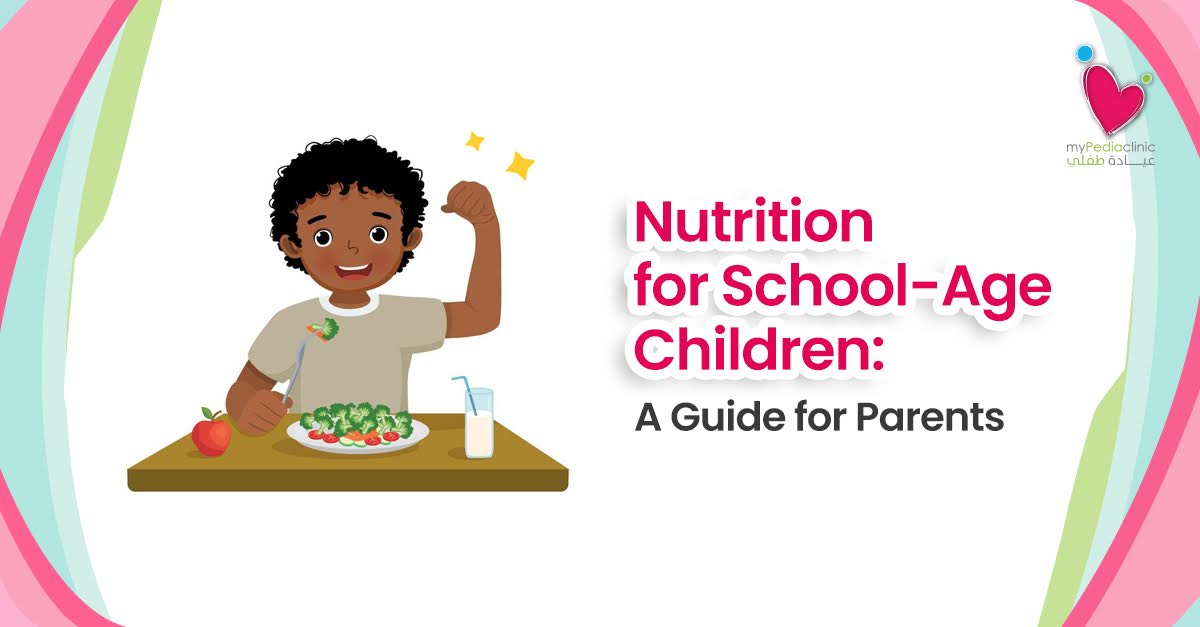Why Nutrition Matters for School-Age Children in Dubai
As your child enters school age (5-12 years), their nutritional needs evolve to support rapid physical growth, brain development, and increased activity levels. In Dubai’s fast-paced environment, with busy school schedules and extracurricular activities, ensuring your child receives proper nutrition can be challenging but is essential for their success and wellbeing.
At myPediaClinic Dubai, our pediatric nutritionists and pediatricians work together to help families establish healthy eating patterns that support optimal growth, academic performance, and lifelong health. This comprehensive guide provides evidence-based nutrition strategies tailored for Dubai families.
Building Blocks of a Balanced Diet for School Children
According to the American Academy of Pediatrics (AAP), school-age children require a balanced diet that includes all major food groups in appropriate portions. Here’s what should be on your child’s plate:
Fruits and Vegetables: The Foundation
The CDC recommends children consume 1.5 to 2.5 cups of vegetables and 1 to 2 cups of fruit daily, depending on age and activity level.
Why They Matter:
- Rich in vitamins A and C, supporting immune function and vision
- High in fiber for healthy digestion and satiety
- Packed with antioxidants that protect growing cells
- Provide essential minerals like potassium and magnesium
Dubai-Friendly Tips:
- Rainbow eating: Encourage eating different colors daily (red tomatoes, orange carrots, green cucumbers, purple eggplant)
- Fresh and convenient: Pre-cut vegetables like carrots, bell peppers, and cherry tomatoes for easy snacking
- Seasonal choices: Dubai’s markets offer excellent dates, pomegranates, mangoes, and local produce
- Creative presentations: Fruit kebabs, vegetable faces on plates, or colorful salads
- Smoothies: Blend fruits with yogurt for a nutritious breakfast or snack
Protein: Building Strong Bodies
School-age children need 19-34 grams of protein daily, depending on age. Protein supports muscle development, tissue repair, and immune function.
Excellent Protein Sources:
- Lean meats: Chicken, turkey, lean beef (grilled, not fried)
- Fish: Salmon, tuna, and local fish (rich in omega-3 fatty acids for brain health)
- Eggs: Versatile and nutrient-dense; one large egg provides 6g protein
- Legumes: Lentils, chickpeas, kidney beans, black beans
- Nuts and seeds: Almonds, walnuts, pumpkin seeds (perfect for school snacks)
- Dairy: Greek yogurt, cheese, milk
- Plant-based options: Tofu, tempeh, edamame for vegetarian families
Practical Serving Ideas:
- A palm-sized portion of grilled chicken (about 60-90g)
- Two eggs for breakfast
- A handful of mixed nuts (about 30g) as an after-school snack
- A cup of cooked lentils in soup or curry
Whole Grains: Sustained Energy
Whole grains provide complex carbohydrates, B vitamins, iron, and fiber. The AAP recommends at least half of all grains be whole grains.
Choose Whole Grains Over Refined:
- Instead of white rice: Brown rice, quinoa, bulgur wheat
- Instead of white bread: Whole wheat bread, whole grain pita
- Breakfast cereals: Oatmeal, whole grain cereal (check labels for <5g sugar per serving)
- Pasta: Whole wheat or legume-based pasta
- Snacks: Whole grain crackers, air-popped popcorn
Benefits for Dubai Students:
- Steady energy release prevents mid-morning crashes at school
- Better concentration and focus during lessons
- Improved mood stability throughout the day
- Enhanced athletic performance in PE and sports
Healthy Fats: Brain Development
Fat is crucial for brain development, which continues through adolescence. Focus on unsaturated fats while limiting saturated and trans fats.
Best Sources:
- Avocados: Monounsaturated fats supporting heart and brain health
- Nuts and seeds: Walnuts, almonds, chia seeds, flaxseeds
- Fatty fish: Salmon, mackerel, sardines (omega-3 DHA for cognitive function)
- Olive oil: For cooking and salad dressings
- Nut butters: Almond butter, peanut butter (choose natural, unsweetened varieties)
Dairy or Alternatives: Calcium and Vitamin D
Children ages 4-8 need 1,000mg calcium daily; ages 9-18 need 1,300mg for strong bones and teeth.
Dairy Options:
- Milk (aim for low-fat or non-fat after age 2)
- Yogurt (Greek yogurt offers more protein)
- Cheese (portion control is important; one slice or 30g per serving)
Dairy-Free Alternatives:
- Fortified soy milk, almond milk, or oat milk (choose calcium and vitamin D fortified)
- Calcium-set tofu
- Fortified orange juice
- Leafy greens (kale, collard greens, bok choy)
Essential Nutrients for Growing Children
Calcium: Building Strong Bones
Peak bone mass development occurs during childhood and adolescence. Adequate calcium now prevents osteoporosis later.
- Daily needs: Ages 4-8: 1,000mg; Ages 9-18: 1,300mg
- Top sources: Dairy products, fortified plant milk, leafy greens, canned fish with bones (sardines, salmon)
- Dubai consideration: Limited sun exposure in indoor environments may require vitamin D supplementation for calcium absorption
Iron: Energy and Focus
Iron deficiency is one of the most common nutritional deficiencies in children, causing fatigue and poor concentration.
- Daily needs: Ages 4-8: 10mg; Ages 9-13: 8mg
- Best sources: Red meat, poultry, fish, fortified cereals, beans, spinach, lentils
- Absorption tip: Pair iron-rich foods with vitamin C (orange, tomato, bell pepper) to enhance absorption
- Warning signs of deficiency: Fatigue, pale skin, difficulty concentrating, frequent infections
Vitamin D: The Sunshine Vitamin
Critical for bone health, immune function, and mood regulation. Dubai’s indoor lifestyle means many children have insufficient vitamin D.
- Daily needs: 600 IU (15 mcg) for children 1-18 years
- Sources: Fortified milk, fatty fish, egg yolks, fortified cereals
- Dubai recommendation: Discuss vitamin D supplementation with your pediatrician, especially if your child spends most time indoors
Omega-3 Fatty Acids: Brain Power
Support cognitive development, memory, learning, and behavior regulation.
- Best sources: Fatty fish (salmon, mackerel, sardines) 2-3 times weekly
- Plant sources: Walnuts, flaxseeds, chia seeds (though less bioavailable than fish sources)
- Supplements: Fish oil or algae-based omega-3 if your child doesn’t eat fish
Fiber: Digestive Health
Supports healthy digestion, prevents constipation, and promotes satiety.
- Daily needs: Age + 5-10 grams (e.g., a 7-year-old needs 12-17g daily)
- Top sources: Whole grains, fruits with skin, vegetables, beans, lentils, nuts
- Hydration: Increase water intake when boosting fiber to prevent constipation
Age-Appropriate Portion Sizes
Understanding appropriate portions prevents overeating and ensures balanced nutrition:
Ages 5-8:
- Fruits: 1-1.5 cups daily (1 medium apple, 1 banana, or 1 cup berries)
- Vegetables: 1.5 cups daily (3 cups raw leafy greens = 1.5 cups cooked)
- Grains: 4-5 ounce-equivalents (1 slice bread = 1 oz; 1/2 cup cooked rice = 1 oz)
- Protein: 3-4 ounce-equivalents (1 oz meat, 1 egg, 1/4 cup cooked beans = 1 oz)
- Dairy: 2.5 cups (1 cup milk, 1 cup yogurt, 1.5 oz cheese)
Ages 9-12:
- Fruits: 1.5 cups daily
- Vegetables: 2-2.5 cups daily
- Grains: 5-6 ounce-equivalents
- Protein: 5 ounce-equivalents
- Dairy: 3 cups
Building Healthy Eating Habits
1. Family Meals Make a Difference
Research shows children who eat regular family meals have better nutrition, higher academic achievement, and lower risk of obesity.
- Aim for at least 3-5 family meals weekly
- Turn off screens during meals
- Make mealtimes pleasant conversation opportunities
- Avoid using food as reward or punishment
2. Involve Children in Food Decisions
- Take children grocery shopping; let them choose fruits and vegetables
- Involve them in age-appropriate cooking tasks
- Plant herbs or vegetables together if possible
- Let them help plan weekly menus
3. Be a Positive Role Model
Children learn eating behaviors by observation:
- Eat the same healthy foods you serve them
- Show enthusiasm for nutritious foods
- Avoid negative food talk or labeling foods as “good” or “bad”
- Demonstrate balanced eating, including occasional treats
4. Establish Regular Meal and Snack Times
- 3 meals and 1-2 planned snacks daily
- Avoid constant grazing which reduces appetite for nutritious meals
- Consistent schedules help regulate hunger and energy
5. Smart Snacking Strategies
Healthy snacks for Dubai school children:
- Fresh fruit with nut butter
- Vegetable sticks with hummus
- Greek yogurt with berries
- Whole grain crackers with cheese
- Trail mix (nuts, seeds, dried fruit)
- Hard-boiled eggs
- Homemade energy balls
Navigating Picky Eating
Picky eating peaks between ages 2-6 but can persist into school years. Here’s how to handle it:
Evidence-Based Strategies:
- Repeated exposure: Research shows children may need to try a food 10-15 times before accepting it
- No pressure: Forcing children to eat creates negative associations
- One new food at a time: Serve alongside familiar favorites
- Involve them in preparation: Children are more likely to try foods they helped prepare
- Make it fun: Creative presentations, dips, food art
- Be patient: Taste preferences evolve; keep offering without pressure
- Address sensory issues: Some children have legitimate texture sensitivities; work with a nutritionist if concerns persist
Hydration in Dubai’s Climate
Proper hydration is crucial in Dubai’s hot environment:
Water Requirements:
- Ages 4-8: 5 cups (1.2 liters) daily
- Ages 9-13: 7-8 cups (1.6-1.9 liters) daily
- Increase during: Physical activity, hot weather, illness
Hydration Tips:
- Send reusable water bottles to school
- Offer water with every meal and snack
- Infuse water with fruit for flavor without added sugar
- Limit juice to 4-6 oz daily; whole fruit is better
- Avoid sugary drinks, sodas, and sports drinks except during intense prolonged exercise
- Monitor urine color; pale yellow indicates good hydration
Foods to Limit
The American Heart Association recommends children consume less than 25g (6 teaspoons) of added sugar daily:
Minimize:
- Sugary beverages (soda, sweetened juice, sports drinks)
- Candy and sweets
- Processed snacks (chips, cookies, packaged cakes)
- Fast food and fried foods
- High-sodium processed meats
Healthier Swaps:
- Water or milk instead of juice/soda
- Fresh fruit instead of candy
- Air-popped popcorn instead of chips
- Homemade baked goods instead of packaged treats
- Grilled or baked instead of fried
Frequently Asked Questions
My child refuses to eat vegetables. What should I do?
Answer: Vegetable rejection is common but can be overcome with patience and strategy. First, continue offering vegetables without pressure; research shows children may need 10-15 exposures before accepting new foods. Second, involve your child in selection and preparation, which increases willingness to try. Third, make vegetables appealing through creative presentation, dips (hummus, yogurt-based dressings), or “hiding” them in favorite foods (spinach in smoothies, grated carrots in pasta sauce). Fourth, be a role model by enthusiastically eating vegetables yourself. Finally, never force or bribe; this creates negative associations. If concerns persist beyond normal pickiness or your child’s growth is affected, consult a pediatric nutritionist at myPediaClinic Dubai for personalized strategies.
How can I pack a healthy school lunch that my child will actually eat?
Answer: Successful school lunches balance nutrition with appeal. Follow this formula: whole grain (sandwich on whole wheat bread, whole grain crackers), protein (lean meat, cheese, hummus, nut butter), fruit (fresh, easy-to-eat options), vegetable (cut vegetables with dip), and water or milk. Involve your child in planning to ensure they’ll eat what’s packed. Use fun containers, cookie cutters for sandwich shapes, or colorful picks to make food appealing. Pack foods at safe temperatures with ice packs or insulated containers. Consider bento-style boxes with variety. Dubai-friendly ideas include whole wheat pita with hummus and vegetables, fruit kabobs, cheese cubes with whole grain crackers, and homemade trail mix. Avoid foods that get soggy or unappetizing by lunchtime.
Should my child take vitamin supplements?
Answer: Most children eating balanced diets don’t need supplements, according to the American Academy of Pediatrics. However, Dubai children may benefit from vitamin D supplementation due to limited sun exposure from indoor lifestyles. Other situations where supplements might be beneficial include: picky eaters with limited food variety, vegetarian/vegan diets (may need B12, iron, zinc), dairy-free diets (calcium and vitamin D), or diagnosed deficiencies. Never give supplements without consulting your pediatrician, as excessive amounts can be harmful. At myPediaClinic Dubai, we can assess your child’s individual needs through dietary review and, if necessary, blood tests. We’ll recommend appropriate supplementation and dosing if needed. Whole foods should always be the primary nutrition source.
How much protein does my school-age child really need?
Answer: Protein needs vary by age: children ages 4-8 need about 19 grams daily, while ages 9-13 need 34 grams. To put this in perspective, one chicken breast (85g) provides about 26 grams, one egg provides 6 grams, and one cup of milk provides 8 grams. Most children easily meet protein needs through regular meals; deficiency is rare in Dubai. Focus on protein quality and variety: include lean meats, fish, eggs, dairy, legumes, and nuts. Distribute protein throughout the day rather than concentrating it in one meal, which supports muscle maintenance and satiety. Athletes or very active children may need slightly more, but excessive protein isn’t beneficial and may displace other important nutrients. Consult myPediaClinic’s nutritionists if you have specific concerns about your child’s protein intake.
My child is always hungry after school. What are healthy snack options?
Answer: After-school hunger is normal as children have often been active and gone several hours since lunch. The key is offering nutrient-dense snacks that provide sustained energy, not empty calories. Best options combine protein and fiber for satiety: apple slices with almond butter, vegetables with hummus, Greek yogurt with granola, cheese with whole grain crackers, hard-boiled egg with fruit, or homemade trail mix. These snacks stabilize blood sugar and provide nutrients for homework and activities. Keep portions appropriate (150-200 calories) so they don’t spoil dinner appetite. Prepare snacks in advance for busy Dubai schedules. Avoid processed snacks high in sugar and refined carbs, which cause energy crashes. Time snacks appropriately: if dinner is within 2 hours, offer a smaller portion or lighter option.
When to Consult a Pediatric Nutritionist
Seek professional guidance if your child experiences:
- Unexplained weight loss or poor growth
- Extreme picky eating affecting nutrition
- Diagnosed food allergies or intolerances
- Chronic digestive issues
- Special dietary needs (vegetarian, cultural, religious)
- Athletic training requiring optimized nutrition
- Disordered eating behaviors
- Chronic health conditions (diabetes, celiac disease, etc.)
Expert Nutrition Support at myPediaClinic Dubai
At myPediaClinic Dubai, our integrated team of pediatricians, nutritionists, and dietitians provides comprehensive nutritional care for school-age children. We understand the unique challenges Dubai families face and offer culturally sensitive, evidence-based guidance.
Our Services Include:
- Personalized nutrition assessments and meal planning
- Growth monitoring and nutritional status evaluation
- Support for picky eaters and feeding challenges
- Management of food allergies and intolerances
- Sports nutrition for young athletes
- Weight management programs
- Education on healthy eating habits
- Family nutrition counseling
Don’t let nutrition confusion hold your child back from reaching their full potential. Contact myPediaClinic Dubai today to schedule a nutrition consultation. Our expert team will create a customized plan that works for your family’s lifestyle, preferences, and your child’s individual needs. Invest in your child’s health, growth, and future success through optimal nutrition.





